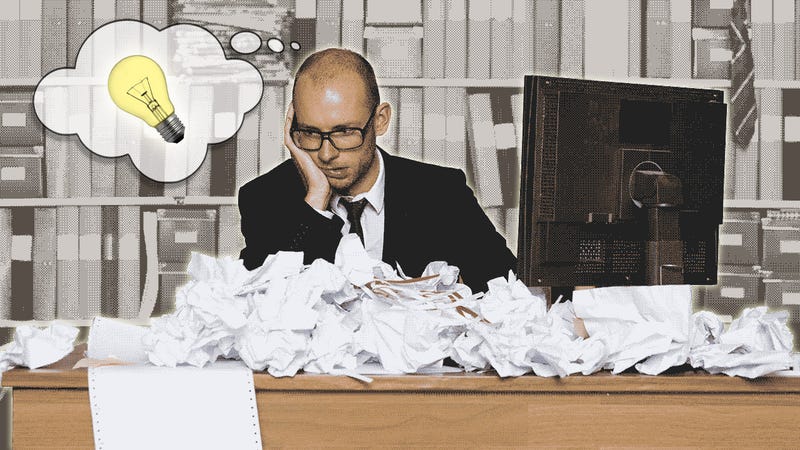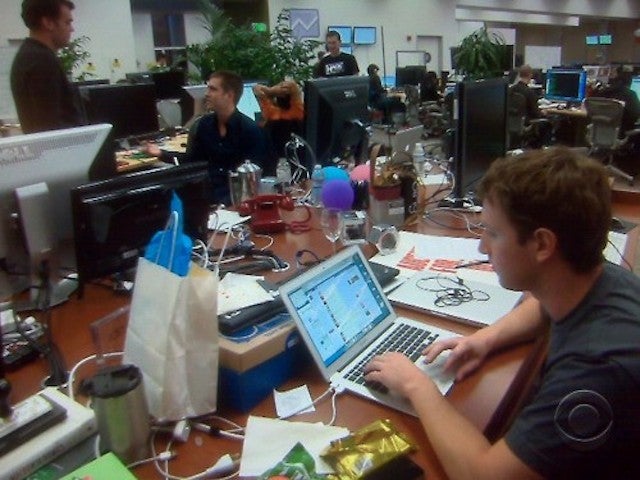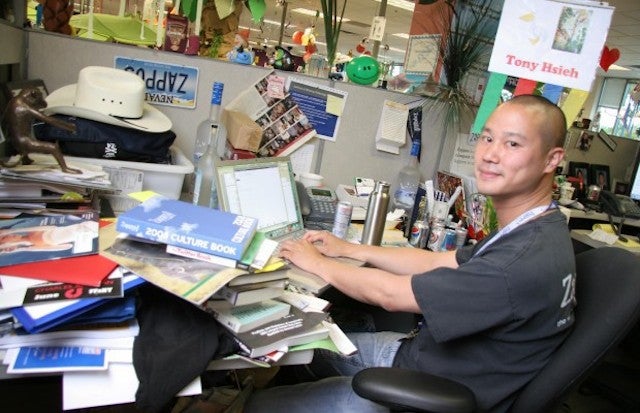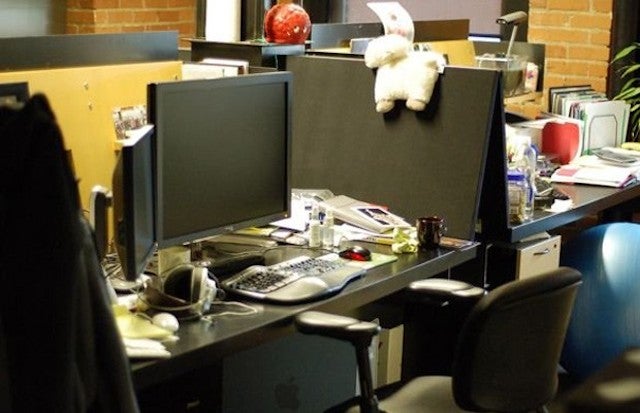Why Creative Geniuses Often Keep a Messy Desk
Steve Jobs, Albert Einstein, and Mark Twain. What is one thing these three visionaries have in common? They all had very messy workspaces.
This post originally appeared on the Busy Building Things Blog.
These three game-changers were never ones to follow the crowd. We can see this by how unconventionally disorganized their desks are. There was a method to this madness: under the mass of papers, magazines, and various objects, there is a sense of organization only the creator can operate through.
Here are some other creative powerhouses that have messy desks:
Mark Zuckerberg, founder and CEO of Facebook hard at work on product.(Image via Tiphereth.)
Tony Hsieh, CEO of Zappos, with everything ranging from books on culture to cowboy hats. (Image via Complex.)
Max Levchin, co-founder and former CTO of PayPal. (Image via Complex.)
Other notable creatives with astonishingly messy desks include programmer and codebreaker Alan Turing, discoverer of penicillin Alexander Fleming, as well as painter Francis Bacon.
Environments have historically played a major factor in how creative our minds are. For example, when he was trying to create the first polio vaccine, medical researcher and virologist Jonas Salk went to the monastery at the Basilica of Assisi in Umbria, Italy and explained in his later days that this environment change helped contribute to the discovery. It doesn't necessarily take such a massive change to prompt creativity; rather, the key to a more creative state of mind can be found right at our desks.
Recently, a study conducted by the University of Minnesota found that people with a messy desk were more prone to creativity and risk taking, while people at cleaner desks tended to follow strict rules and were less likely to try new things or take risks. Dr. Vohs and her co-authors conclude in the study, "Disorderly environments seem to inspire breaking free of tradition, which can produce fresh insights."
Calibrating Creativity and Efficiency
Rather than leaving a desk in a state of constant messiness, it can be helpful to modify the environment as it suits our needs. Think of messiness and cleanliness as a spectrum that also has a corresponding creativity setting.
The study in the University of Minnesota featured an experiment where respondents with clean desks chose apples over candy bars, and selected more established solutions over new ones. When you're generating ideas and concepts, it could help to have a messier desk. However, when you're trying to be productive, getting a specific task accomplished, or simply need to execute on a creative concept, cleaning your desk can "trade in" your creativity for efficiency.
In case you are trying to be more creative, here are some ideas: instead of throwing out those magazines right after you're done with them, leave them hanging around your desk. Don't shelf those books yet. Keep anything that could potentially inspire you (including art prints). "There are two types of messy environments," Vohs said in an interview with NY Daily News. "One is unkempt and one is dirty. I don't think these results suggest leaving around banana peels and dirty dishes for a week."
Social Perceptions
This creativity comes with a social cost: as staffing firm Adecco discovered, the majority of our colleagues and peers judge us based on how clean (or dirty) our desks are. Should your desk be left in a perpetually messy state, "They think that you must be a slob in your real life," says Adecco's VP of Recruiting Jennie Dede in an interview with Forbes.
While remaining hygienic would minimize the possibility of this scenario, here's another reason not to leave your desk in a constant mess. Adjust it along the spectrum between the ends of creativity and efficiency. Be aware of the impression you may be giving to colleagues, but don't be afraid to explain your reasons for an intentionally messy desk—you've got anecdotal and empirical evidence right here.
Closing Thoughts
Starting at very early ages, we have been trained to clean up our toys and make our beds. But perhaps our mothers had it wrong. As you can see from the examples above, messy environments can enhance our creativity by letting our lives get a little messy.
Why You Should Have a Messy Desk | Busy Building Things
Inspiration is a fuel, a temporary ability to do tough things. Companies like Facebook, Google, and Shopify renew their inspiration by using our art products. Get busy building things. This post was written by Herbert Lui and edited by Robleh Jama.
Want to see your work on Lifehacker? Email Tessa.
The following replies are approved. To see additional replies that are pending approval, click Show Pending. Warning: These may contain graphic material.
 redfoodBusy Building Things3/03/14 7:53amI had a brilliant Math professor in college (the kind that is so smart its hard for them to have a normal conversation) who's office was kneed deep in stacks of paper with a narrow path to his desk which was also covered in papers. It looked like a borders nest.One day we were talking about something and he said "ooh I have a paper about that." I walked into his office a yard, took a step to the right, and reached down and pulled out the paper from the middle of a stack - first try. It was amazing.Reply
redfoodBusy Building Things3/03/14 7:53amI had a brilliant Math professor in college (the kind that is so smart its hard for them to have a normal conversation) who's office was kneed deep in stacks of paper with a narrow path to his desk which was also covered in papers. It looked like a borders nest.One day we were talking about something and he said "ooh I have a paper about that." I walked into his office a yard, took a step to the right, and reached down and pulled out the paper from the middle of a stack - first try. It was amazing.Reply donniedarko2001Busy Building Things3/03/14 7:48amWhile I'm in the creative messy desk group and I work better with a messy desk. Having a messy desk isn't going to make someone who isn't creative suddenly creative. The seeming chaos is both a tool and a reflection of the inner creative process. It is not a universal constant. If you aren't already wired that way it will not magically make you something you aren't.Reply
donniedarko2001Busy Building Things3/03/14 7:48amWhile I'm in the creative messy desk group and I work better with a messy desk. Having a messy desk isn't going to make someone who isn't creative suddenly creative. The seeming chaos is both a tool and a reflection of the inner creative process. It is not a universal constant. If you aren't already wired that way it will not magically make you something you aren't.Reply AaronTheGreatBusy Building Things3/03/14 6:11amOr... just screwing around on Facebook.Reply
AaronTheGreatBusy Building Things3/03/14 6:11amOr... just screwing around on Facebook.Reply DanYHKimBusy Building Things3/03/14 11:05amProverbs 14:4 CJBWhere there are no oxen, the stalls are clean; but much is produced by the strength of an ox.Reply
DanYHKimBusy Building Things3/03/14 11:05amProverbs 14:4 CJBWhere there are no oxen, the stalls are clean; but much is produced by the strength of an ox.Reply gerrrgBusy Building Things3/03/14 7:17amI have two kinds of mess.
gerrrgBusy Building Things3/03/14 7:17amI have two kinds of mess.- The mess that doesn't require immediate attention and shall sit there until it absolutely needs to be dealt with.
- The mess that I leave around because I want it to stew in my head.
In either case, I generally do remember what's where, even if under a stack.BobI always say I have a very sophisticated "piling5  TertioptusBusy Building Things3/03/14 10:19amThis is beyond anecdotal retardation! Not quite sure how to succinctly craft the entirety of sentiments that I am now burdened with from reading this inane "bulshivitz". [Gesundheit ]Post hoc ergo propter hoc. Example: I want to play in the NFL. NFL players often have had concussions. Have a concussion, and play in the NFL.These idiot savants weren't geniuses because they excelled in chaotic environments. They're just imperfect people who are really smart and creative, who have yet to find a system that could keep up with or rather not get in the way of their productivity. Look again at the alleged messy desks, to some they are rather neat and structured.If you go around telling work bees to throw caution to the wind, and throw magazines around they are going to become useless. Only thing they are going to create is a way to organize those magazines. It's not going to make them an architect.No offense to the author. But I think a lot of these "geniuses" would be better served with an organized environment that would free them up to create even greater things.Reply
TertioptusBusy Building Things3/03/14 10:19amThis is beyond anecdotal retardation! Not quite sure how to succinctly craft the entirety of sentiments that I am now burdened with from reading this inane "bulshivitz". [Gesundheit ]Post hoc ergo propter hoc. Example: I want to play in the NFL. NFL players often have had concussions. Have a concussion, and play in the NFL.These idiot savants weren't geniuses because they excelled in chaotic environments. They're just imperfect people who are really smart and creative, who have yet to find a system that could keep up with or rather not get in the way of their productivity. Look again at the alleged messy desks, to some they are rather neat and structured.If you go around telling work bees to throw caution to the wind, and throw magazines around they are going to become useless. Only thing they are going to create is a way to organize those magazines. It's not going to make them an architect.No offense to the author. But I think a lot of these "geniuses" would be better served with an organized environment that would free them up to create even greater things.Reply timgrayBusy Building Things3/03/14 9:05amI keep a messy desk because I do not have time to waste with cleaning it. Seriously if they want my desk clean then I get all day Friday or Monday to do nothing but organize and clean. Or they can stop giving me 5X normal human workload if being "neat and tidy" is that important.Oh and none of those examples are "messy" desks. you can still see desk in each of them.Reply
timgrayBusy Building Things3/03/14 9:05amI keep a messy desk because I do not have time to waste with cleaning it. Seriously if they want my desk clean then I get all day Friday or Monday to do nothing but organize and clean. Or they can stop giving me 5X normal human workload if being "neat and tidy" is that important.Oh and none of those examples are "messy" desks. you can still see desk in each of them.Reply CostermongerBusy Building Things3/03/14 9:20amThere is a vast difference between 'dirty' and 'cluttered.' You can be disorganised and still be sanitary.2
CostermongerBusy Building Things3/03/14 9:20amThere is a vast difference between 'dirty' and 'cluttered.' You can be disorganised and still be sanitary.2





 DonutsBusy Building Things
DonutsBusy Building Things AlexCLDonuts
AlexCLDonuts Nerdfesttimgray
Nerdfesttimgray Pie Snatcheruthor1981
Pie Snatcheruthor1981 DaveSevredfood
DaveSevredfood jeepingeekdonniedarko2001
jeepingeekdonniedarko2001 Tracey Smithdonniedarko2001
Tracey Smithdonniedarko2001 AndyWSmallAaronTheGreat
AndyWSmallAaronTheGreat JiaJemAaronTheGreat
JiaJemAaronTheGreat
No comments:
Post a Comment